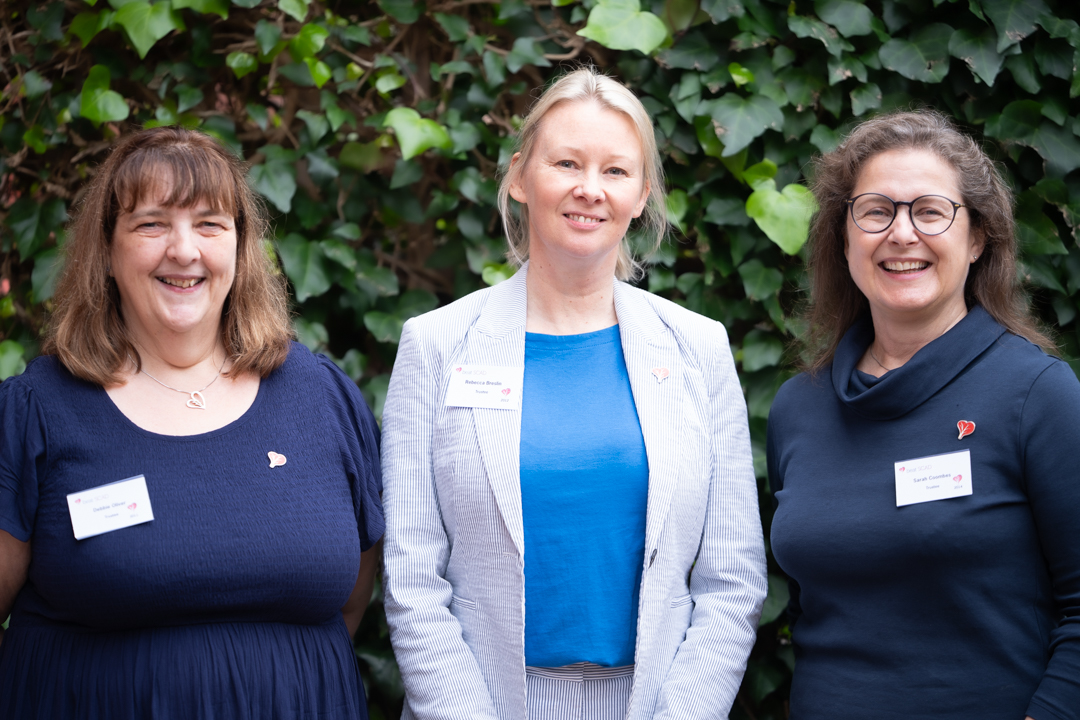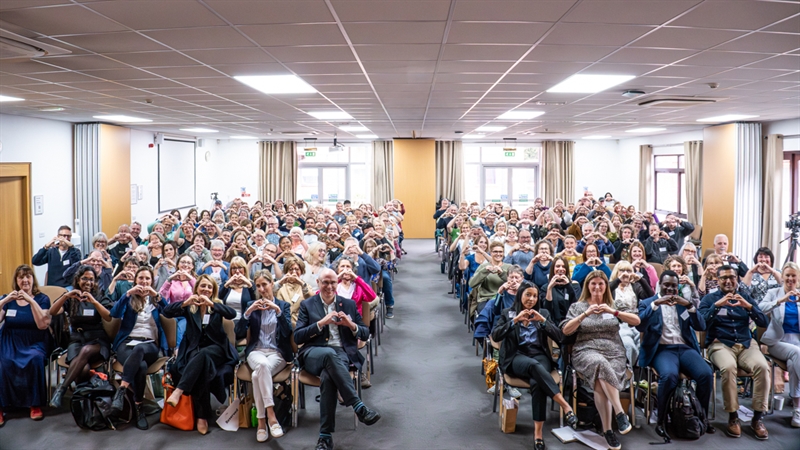The fifth Beat SCAD Conference took place in Leicester on 11 October and celebrated 10 years of hope, partnership, progress and empowering SCAD patients.
We welcomed 150 delegates, including 83 SCAD patients, their families and friends, and healthcare professionals and researchers.
Beat SCAD celebrates its tenth birthday on 7 November and Rebecca Breslin, Chair and Co-founder of Beat SCAD, started the day by summarising the charity’s successes and outlining our aims for the future.
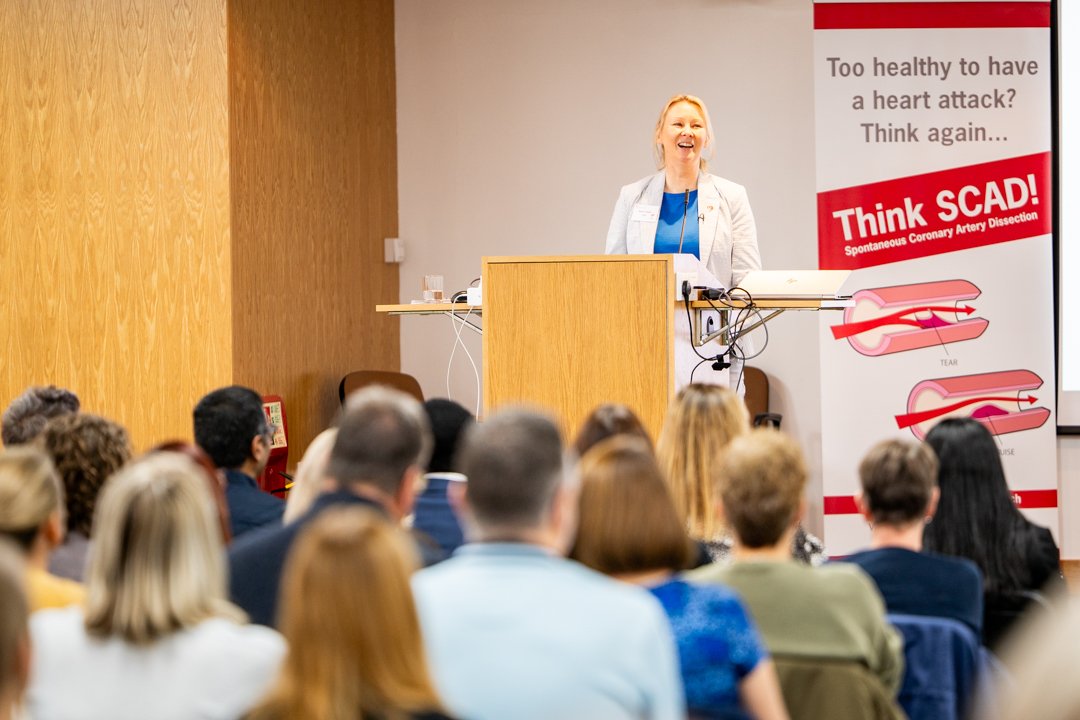
She then premiered a short video with a snapshot of our achievements over the past decade and how the community has helped us in our mission to raise awareness of SCAD, support those affected and fundraise for research. You can watch it here.
Some of the figures that demonstrate our impact over the past decade, include:
- more than 15,550 leaflets distributed
- more than 64,500 views of our Youtube videos
- more than 460 healthcare professionals have attended our educational sessions
- more than 1,000 people have attended our events (5 conferences, 5 walks and 4 online events)
- 90 people have been supported by our Buddy service
- Gross income is over £585,000 (actual figure pending finalisation of year 10 accounts)
- £425,100 donated to research, with our latest award of £29,100 co-funding a Research Assistant for four years.
- for every £1 spent, we have donated 80.5p to research, 9.8p has been used for other charitable activities (ie events, merchandise, promotional expenses), with just 9.7p used to run the charity (including banking, insurance, accounting, website, postage and fundraising expenses).
Volunteers
Rebecca highlighted the vital role volunteers play in carrying out our work and noted that Beat SCAD has no paid employees. She thanked the many volunteers who have contributed to various projects over the years, and introduced our new Volunteer Manager, Emma Rose, who is helping us to expand our volunteer network, aiming to bring additional skills to the team, so we can achieve even more in the coming years.
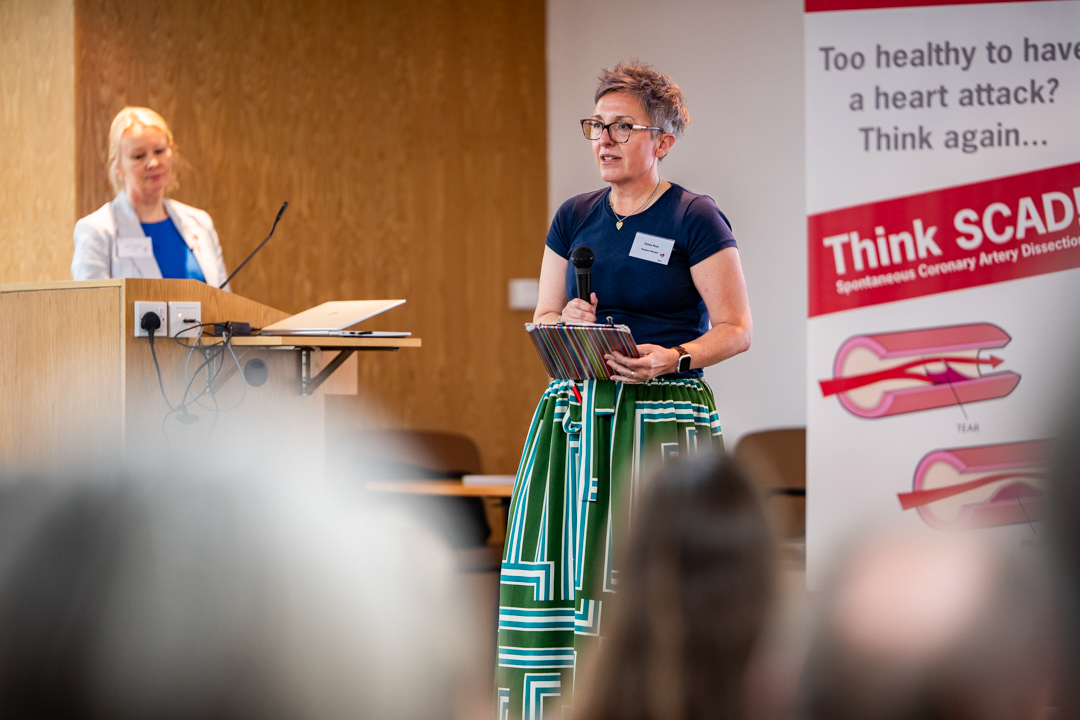
Emma is a SCAD patient and told the conference audience “For the last 20 years I’ve worked in the third sector managing volunteer teams at various organisations and it just seemed the right thing to do to offer to help [Beat SCAD]”.
If you’re interested in volunteering, please complete this form.
Understanding SCAD
Dr David Adlam, who is leading the SCAD research in Leicester, then took the floor and talked about what we know about SCAD. He posed the question of whether SCAD is becoming more common, saying the UK SCAD clinics are seeing more than 500 patients a year, and this is probably not reaching all SCAD patients. It’s estimated that at least four SCADs occur in the UK every day.
He then discussed what SCAD is, symptoms and diagnosis, and treatment including medication, saying every SCAD patient is different so there’s no one-size-fits all approach, and that clinical trials will help provide better answers in future.
Other subjects covered included contraception, pregnancy and HRT, post-SCAD chest pain, and the psychological impact of SCAD.
Dr Adlam then went on to say more capacity is needed for SCAD clinical services and that it’s critical for these services to be networked for research and educational purposes.
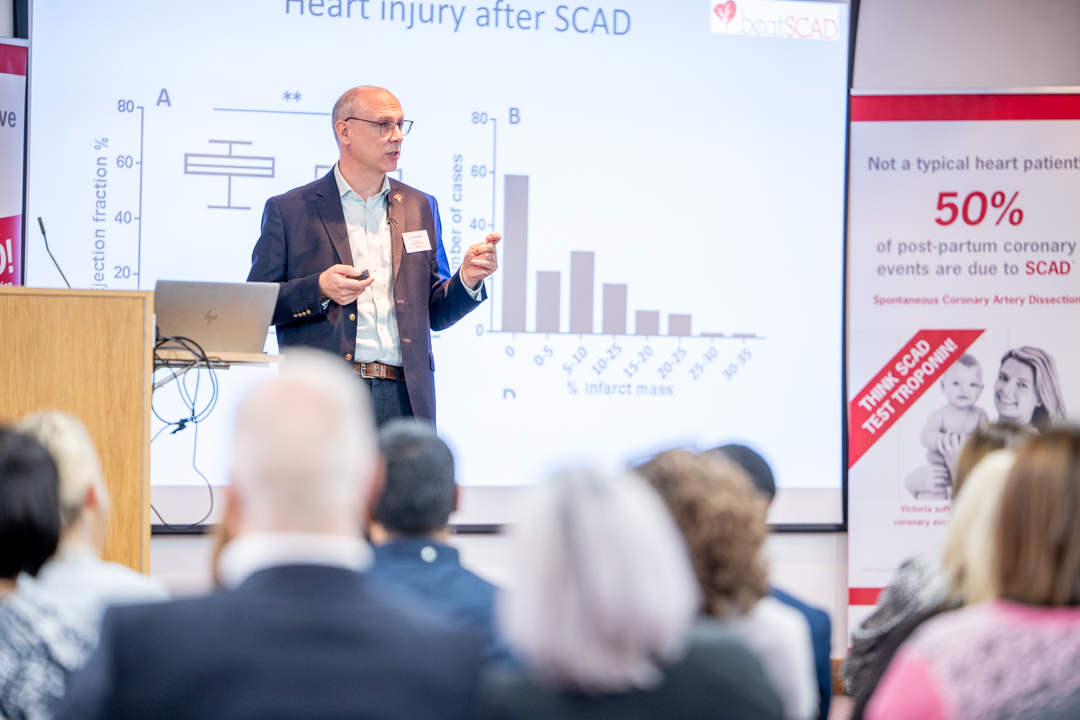
Fibromuscular Dysplasia
Many SCAD patients are also diagnosed with Fibromuscular Dysplasia (FMD) and Dr Tina Chrysochou, Consultant Nephrologist at Salford Royal and UK lead for the UK FMD study, provided a review of what FMD is, how it is identified and what SCAD patients should know about it. FMD is thought to be present in 3-6% of the adult population and, for SCAD patients who have FMD it tends to be mild.
Dr Chrysochou explained how she set up the UK’s first multi-disciplinary FMD clinic in Salford, something that was top of a wish list from patients. She discussed management of FMD, how to get referred to the clinic and sign up to the FMD study.
Watch Dr Chrysochou's talk here.
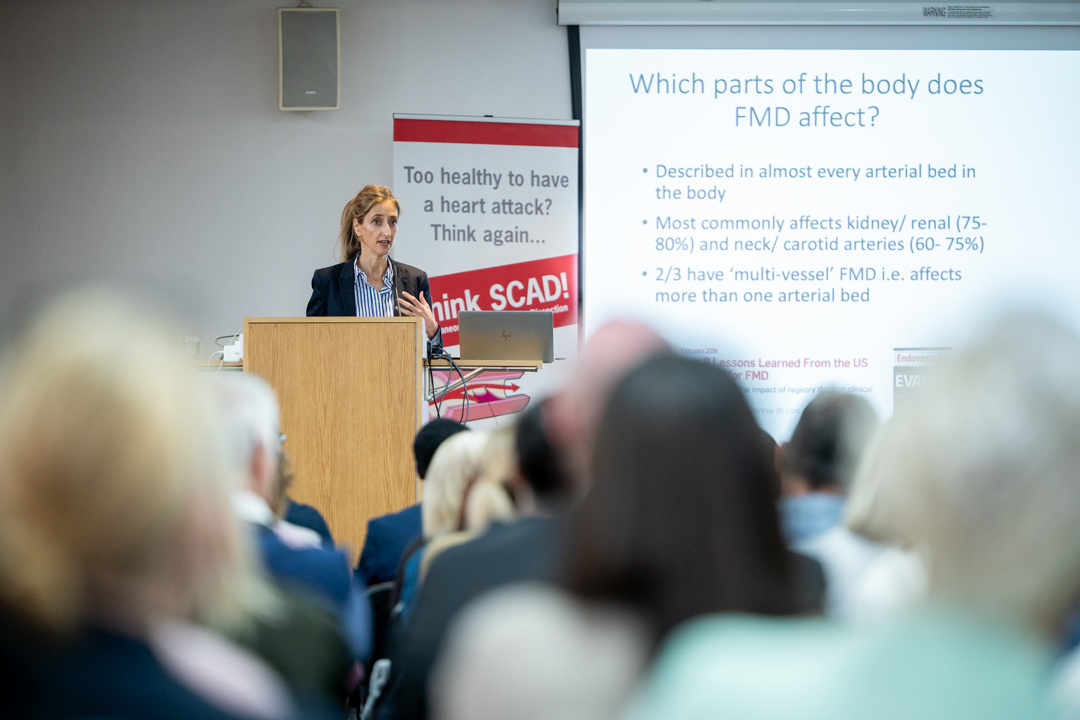
The lived experience of SCAD patients
Marissa Plaza has recently completed a PhD investigating the ‘lived experience’ of SCAD patients'. She approached us when she started the PhD to ask for our help recruiting patients and supporting her work, and we were pleased to be able to help.
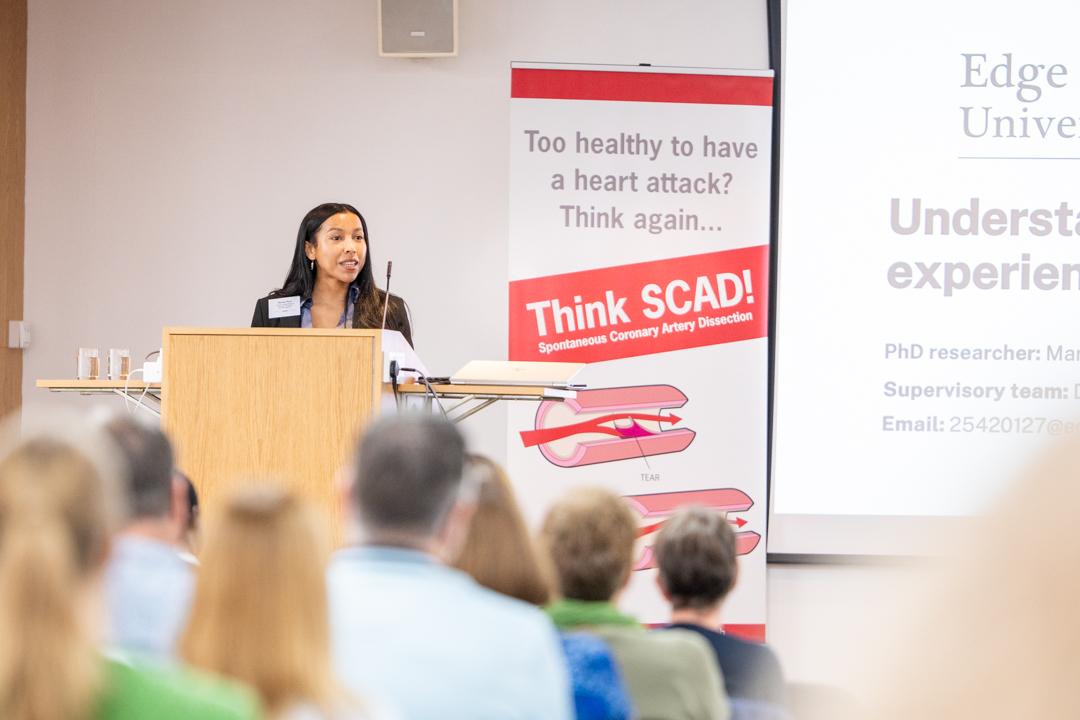
She took us through the five main themes identified by the patients recruited to the study: mental wellbeing, physical activity and physical health, cardiac rehab, lack of understanding and support by healthcare professionals, and lack of information.
She concluded that SCAD patients experience mental and physical deterioration and would benefit from longer-term support; there is a significant lack of awareness of SCAD among healthcare professionals; and training and better provision of advice and guidance for patients is essential.
The patient perspective
Laura Lock, who had her SCAD in January 2024, told delegates about her experience, including a sense of loss, grief and isolation. She felt judged, confused and unsupported. She described her journey back to fitness and getting a new sense of purpose.
She admitted she returned to work too quickly in a bid for ‘normality’ and found it hard to advocate for herself. Despite the issues and setbacks, Laura was always hopeful and maintained her sense of humour. Her inspirational talk was entirely relatable to fellow SCAD patients and was very well received by all in the room.
Watch Laura's talk here starting at about 8 minutes.
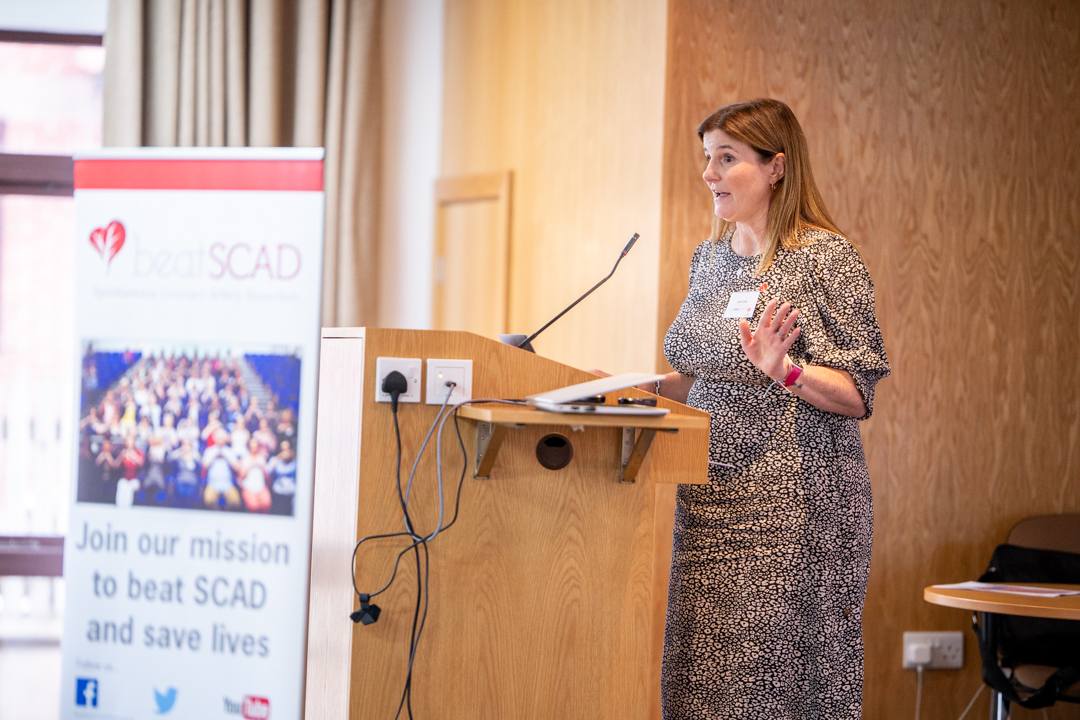
Current research
After a busy lunch, where delegates were able to network, hear each other’s stories and post on the Inspiration Board, Dr Adlam talked about the progress of research, including a project to look further into genetics and the clinical trials looking at medication.
He then introduced a panel who explained their projects.
Watch the research panel video here.
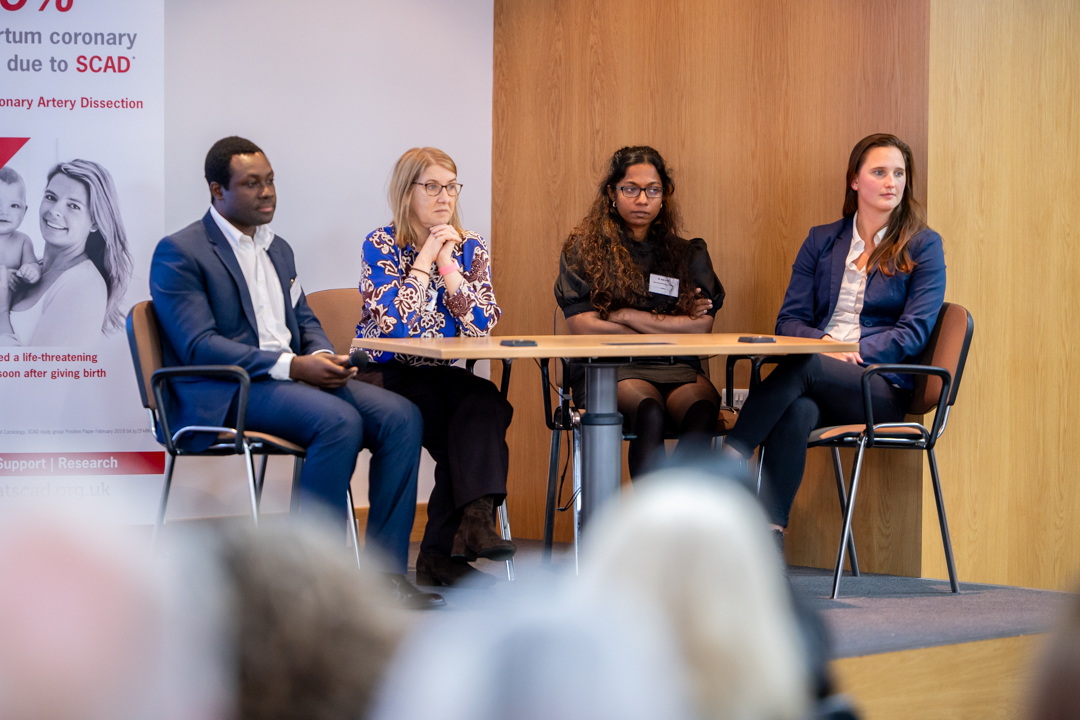
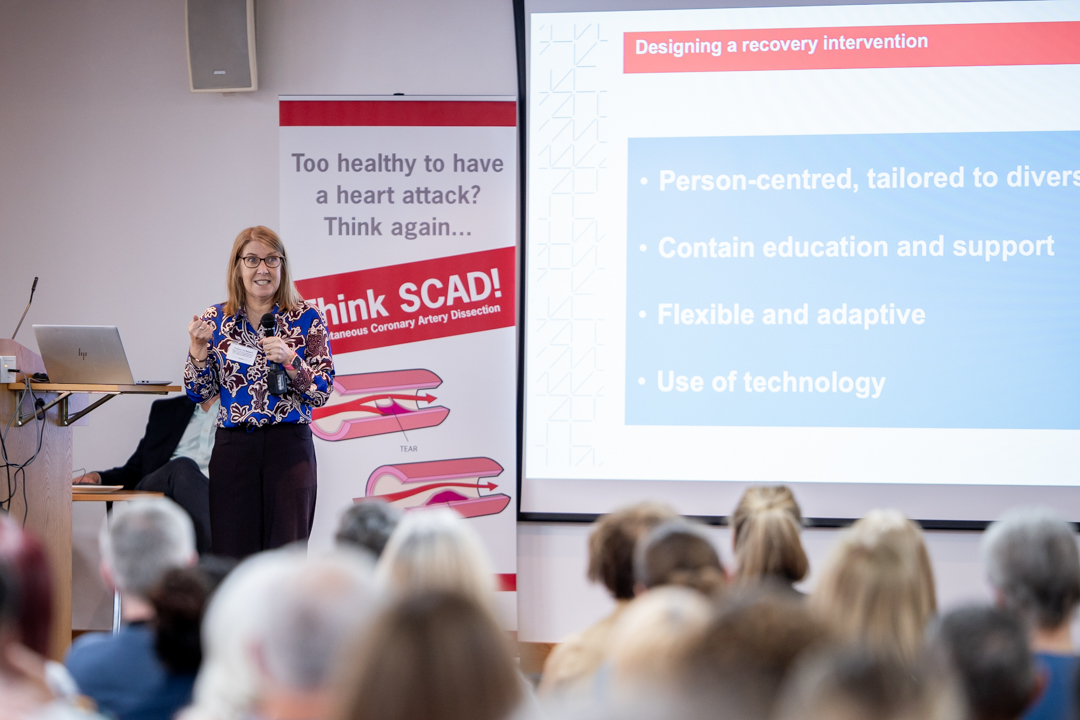
Professor Lis Neubeck, Head of the Centre for Cardiovascular Health at Edinburgh Napier University, updated us on the remote recovery intervention for SCAD patients and the success of the SCAD Clinic at Forth Valley Hospital, which is supported by Dr Adlam. She said the clinic has received 90 referrals, seeing 64 patients. 79% of patients were referred to cardiac rehab and the clinic has had a 100% patient satisfaction rating.
Prof Neubeck worked with 26 patients to co-design a tailored recovery programme for SCAD patients, which involved an eight-week exercise and counselling intervention. She said the high completion rate of the programme indicates that the intervention is highly acceptable to SCAD patients.
Dr Anju Velvet, Clinical Research Fellow, talked about her work to understand the role of sex hormones in SCAD. She is looking at women of child-bearing age (both SCAD patients and non-SCAD patients as healthy volunteers for comparison), at two different points in the menstrual cycle and performing MRI scans, testing exercise and sex hormone levels.
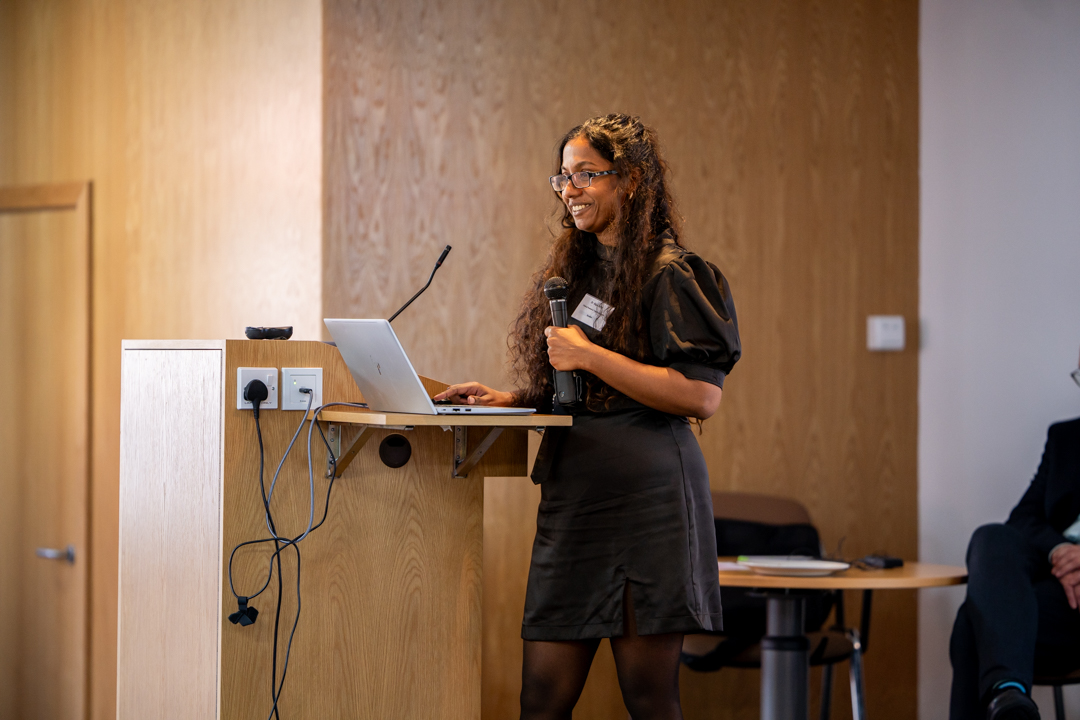 She is also recruiting patients into a clinical trial to investigate the efficacy of managing post-SCAD chest pain with HRT and the safety of HRT in peri- and post-menopausal women. She’s looking for peri- and post-menopausal patients aged 45 or over with SCAD diagnosed within the past three years and who had chest pain for at least four days in the previous month. Participants will be randomly allocated to an HRT or a placebo group and frequency and severity of chest pain will be monitored. For more information and to take part click here.
She is also recruiting patients into a clinical trial to investigate the efficacy of managing post-SCAD chest pain with HRT and the safety of HRT in peri- and post-menopausal women. She’s looking for peri- and post-menopausal patients aged 45 or over with SCAD diagnosed within the past three years and who had chest pain for at least four days in the previous month. Participants will be randomly allocated to an HRT or a placebo group and frequency and severity of chest pain will be monitored. For more information and to take part click here.
Dr Charles Badu-Boateng, Clinical Research Fellow, discussed how diagnosis of SCAD could be improved using imaging techniques and artificial intelligence (AI). Angioplasty can be risky for SCAD patients as their arteries tend to be fragile, so a non-invasive way of diagnosing SCAD would reduce that risk. He is investigating whether looking at the tortuosity (shape) of the arteries and the levels of inflammation in the artery could help assess and diagnose SCAD, and how AI can help. His aim is to develop a standardised CT protocol that can improve diagnosis and assessment of SCAD worldwide.
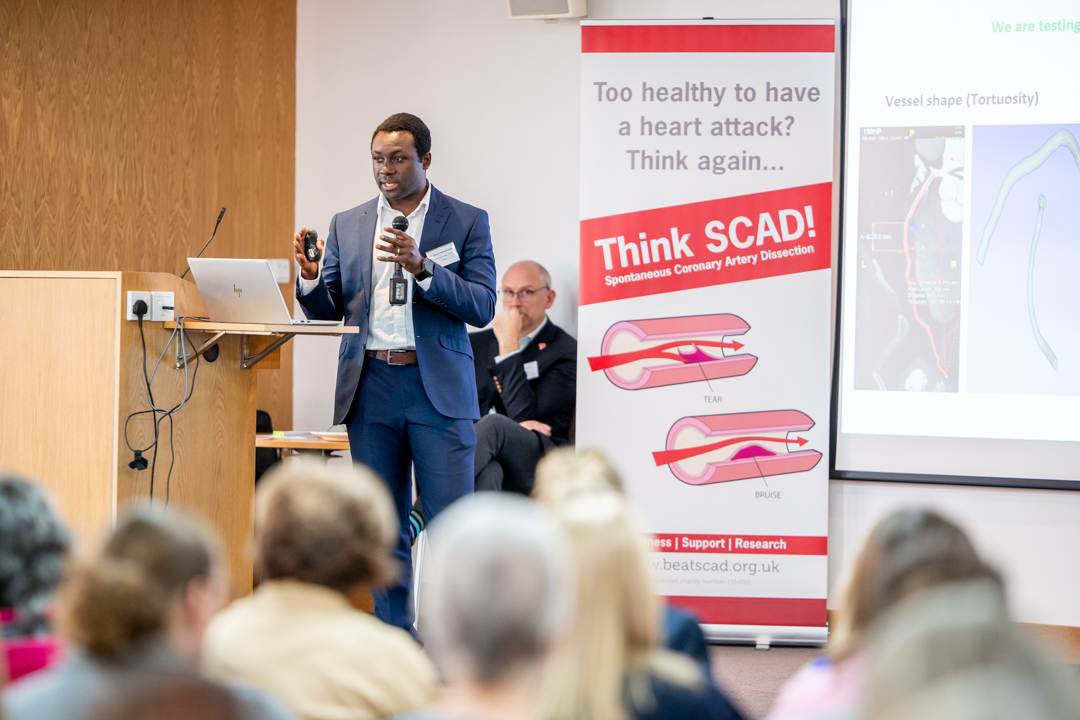
Dr Noemi Vadaszy, Research Exercise Physiologist, discussed her research into physical activity and SCAD. Traditional cardiac rehab may not be appropriate for SCAD patients and, following on from research done by Professor Neubeck and her team, Dr Vadaszy said a SCAD-specific recovery programme should include tailored exercise and advice, wearable technology and psychosocial support.
She is doing a randomised control trial (RCT) to investigate the feasibility of a 12-week remote exercise programme and to understand the relationship between physical activity and SCAD and its symptoms, including chest pain. The project is delivered in Leicester with collaboration from Dr Coral Hanson (Principal Investigator of the study) from Edinburgh Napier University and the University of West of Scotland.
Eligible participants will receive an invitation via phone, email or post. If you are interested or have questions about the study, please email Dr Vadaszy.
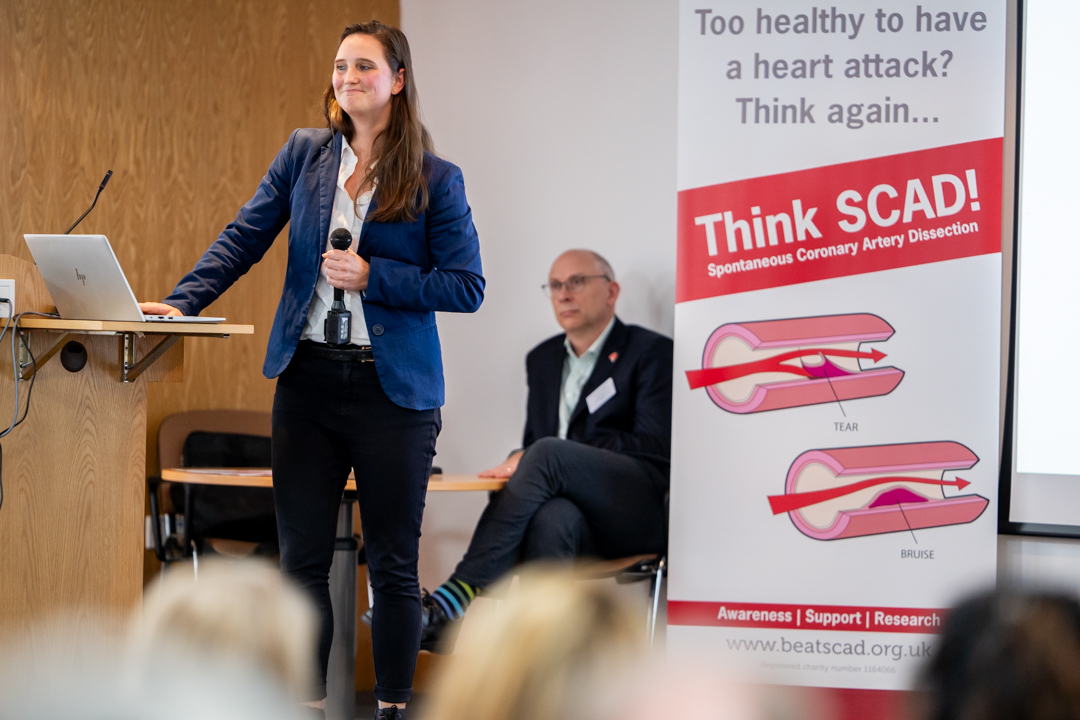
Dr David Adlam (pictured below with the speakers) commented: ‘It was a fantastic day. You should be so proud of everything you have achieved. Beat SCAD are referenced internationally as the example to follow for less common disease patient information, advocacy and fundraising. The UK research and clinical service would have petered out years ago without the funds you have raised and the inspiration you give to us all.’
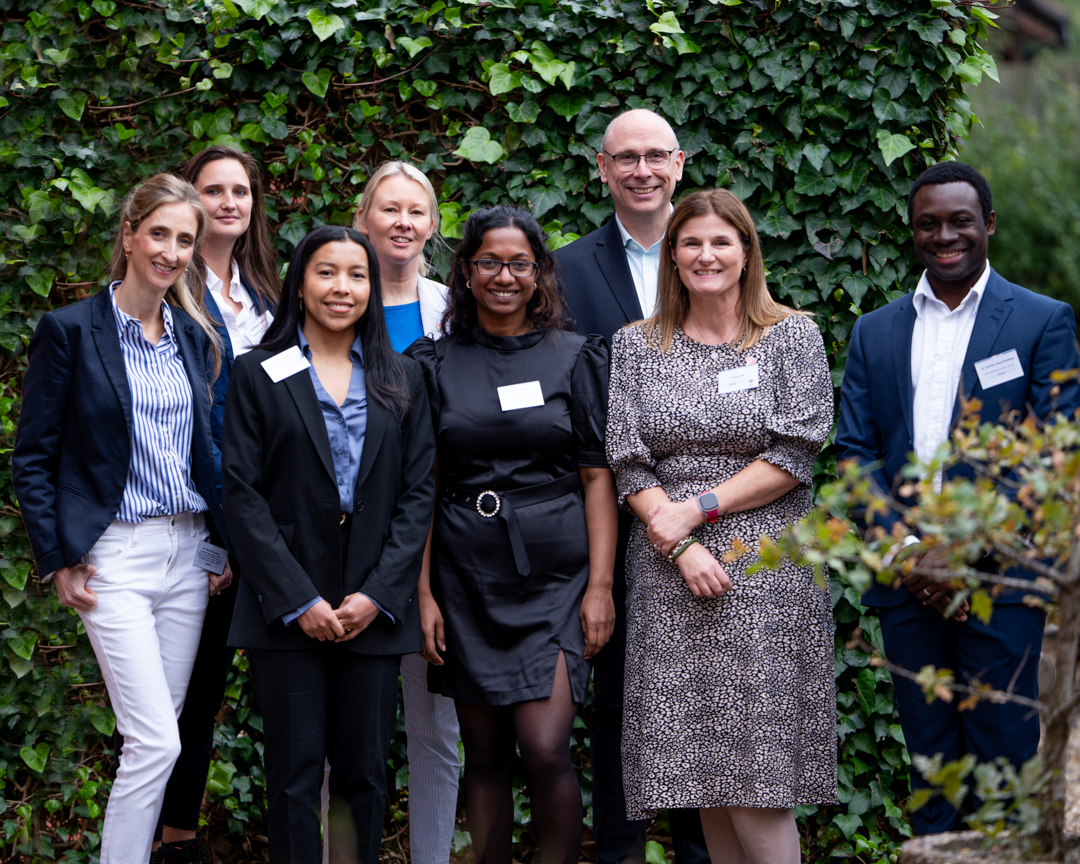
Rebecca Breslin said: ‘Our fifth Beat SCAD conference was a triumph! Months of preparation and then a truly wonderful day that was over in the blink of an eye but thoroughly enjoyed by all. It is always a privilege to listen to and learn from the researchers who are so generous with their knowledge and time, and fantastic to meet fellow SCAD patients and their supporters. Huge thanks to all involved for making it such a wonderful day.’
Thanks to everyone who attended and made the day such a success. We hope you enjoyed meeting other SCAD patients, families, friends and healthcare professionals. Thanks also to the team at the venue, the NSPCC National Training Centre, Leicester, for helping ensure the day ran smoothly and to the team at Triskelle Pictures, who did such a wonderful job of recording the presentations and taking photos.
You can watch the highlights video here.
Click here to watch Rebecca's round-up of the day.
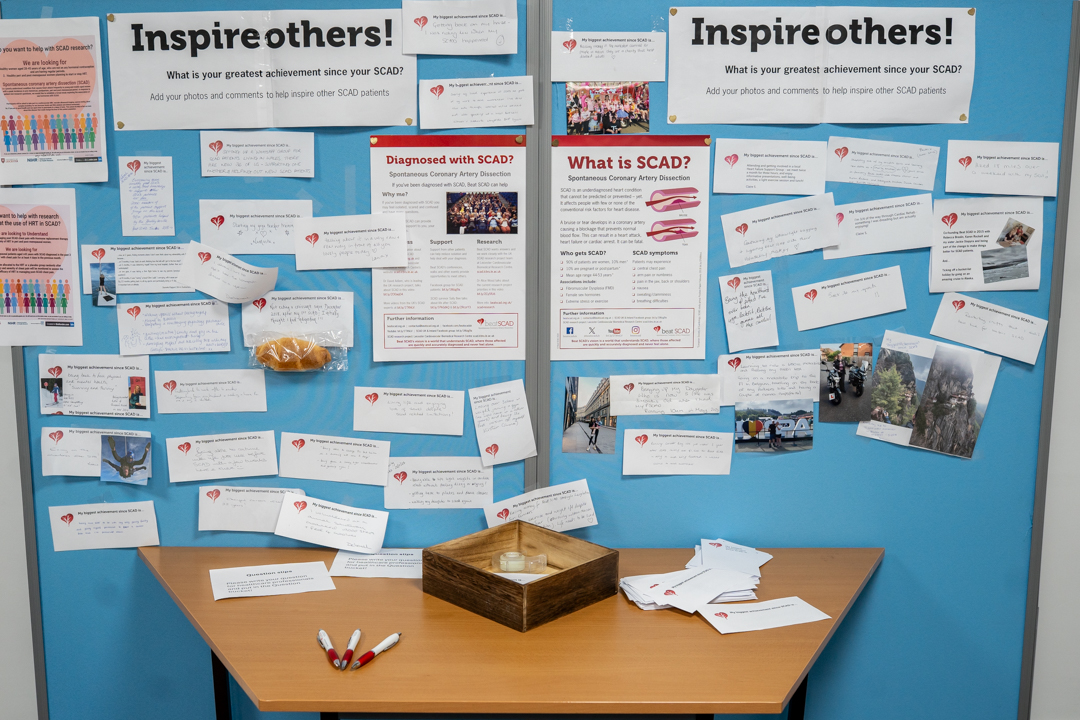
Beat SCAD Trustees pictured below.
